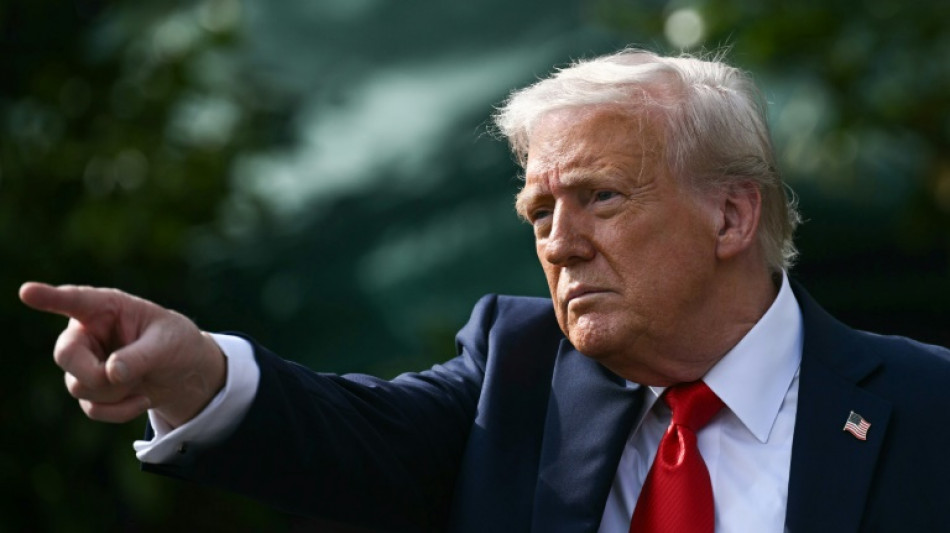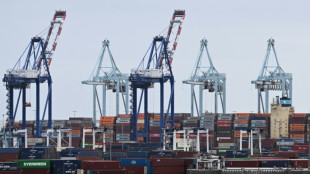
-
 Tesla sales plunge further in France, down 59% in April
Tesla sales plunge further in France, down 59% in April
-
US calls on India and Pakistan to 'de-escalate'

-
 Israel reopens key roads as firefighters battle blaze
Israel reopens key roads as firefighters battle blaze
-
Europe far-right surge masks divisions

-
 James will mull NBA future after Lakers playoff exit
James will mull NBA future after Lakers playoff exit
-
Ukraine's chief rabbi sings plea to Trump to side with Kyiv

-
 Australian mushroom meal victim 'hunched' in pain, court hears
Australian mushroom meal victim 'hunched' in pain, court hears
-
Lakers dumped out of playoffs by Wolves, Rockets rout Warriors

-
 Booming tourism and climate change threaten Albania's coast
Booming tourism and climate change threaten Albania's coast
-
US reaching out to China for tariff talks: Beijing state media

-
 Tariffs prompt Bank of Japan to lower growth forecasts
Tariffs prompt Bank of Japan to lower growth forecasts
-
Kiss faces little time to set Wallabies on path to home World Cup glory

-
 Serbian students, unions join forces for anti-corruption protest
Serbian students, unions join forces for anti-corruption protest
-
Slow and easily beaten -- Messi's Miami project risks global embarrassment

-
 Fan in hospital after falling to field at Pirates game
Fan in hospital after falling to field at Pirates game
-
Nuclear power sparks Australian election battle

-
 Tokyo stocks rise as BoJ holds rates steady
Tokyo stocks rise as BoJ holds rates steady
-
Bank of Japan holds rates, lowers growth forecasts

-
 'Sleeping giants' Bordeaux-Begles awaken before Champions Cup semis
'Sleeping giants' Bordeaux-Begles awaken before Champions Cup semis
-
Napoli eye Scudetto as Inter hope for post-Barca bounce-back

-
 Germany's 'absolutely insane' second tier rivalling Europe's best
Germany's 'absolutely insane' second tier rivalling Europe's best
-
PSG minds on Arsenal return as French clubs scrap for Champions League places

-
 UK WWII veteran remembers joy of war's end, 80 years on
UK WWII veteran remembers joy of war's end, 80 years on
-
Myanmar junta lets post-quake truce expire

-
 Rockets romp past Warriors to extend NBA playoff series
Rockets romp past Warriors to extend NBA playoff series
-
Messi, Inter Miami CONCACAF Cup dream over as Vancouver advance

-
 UN body warns over Trump's deep-sea mining order
UN body warns over Trump's deep-sea mining order
-
UK local elections test big two parties

-
 US judge says Apple defied order in App Store case
US judge says Apple defied order in App Store case
-
Seventeen years later, Brood XIV cicadas emerge in US

-
 Scorching 1,500m return for Olympic great Ledecky in Florida
Scorching 1,500m return for Olympic great Ledecky in Florida
-
Israel's Netanyahu warns wildfires could reach Jerusalem

-
 Istanbul lockdown aims to prevent May Day marches
Istanbul lockdown aims to prevent May Day marches
-
Australian guard Daniels of Hawks named NBA's most improved

-
 Mexico City to host F1 races until 2028
Mexico City to host F1 races until 2028
-
Morales vows no surrender in bid to reclaim Bolivian presidency

-
 Ukraine, US sign minerals deal, tying Trump to Kyiv
Ukraine, US sign minerals deal, tying Trump to Kyiv
-
Phenomenons like Yamal born every 50 years: Inter's Inzaghi

-
 Ukraine, US say minerals deal ready as Kyiv hails sharing
Ukraine, US say minerals deal ready as Kyiv hails sharing
-
Global stocks mostly rise following mixed economic data

-
 O'Sullivan says he must play better to win eighth snooker world title after seeing off Si Jiahui
O'Sullivan says he must play better to win eighth snooker world title after seeing off Si Jiahui
-
Sabalenka eases past Kostyuk into Madrid Open semis

-
 Netflix's 'The Eternaut' echoes fight against tyranny: actor Ricardo Darin
Netflix's 'The Eternaut' echoes fight against tyranny: actor Ricardo Darin
-
US economy unexpectedly shrinks, Trump blames Biden

-
 Barca fight back against Inter in sensational semi-final draw
Barca fight back against Inter in sensational semi-final draw
-
Meta quarterly profit climbs despite big cloud spending

-
 US Supreme Court weighs public funding of religious charter school
US Supreme Court weighs public funding of religious charter school
-
Climate change made fire conditions twice as likely in South Korea blazes: study

-
 Amorim says not even Europa League glory can save Man Utd's season
Amorim says not even Europa League glory can save Man Utd's season
-
Syria reports Israeli strikes as clashes with Druze spread


Trump signs order aimed at lowering drug prices
US President Donald Trump signed an executive order Tuesday aiming to lower crippling drug prices by giving states more leeway to bargain-hunt abroad and improving the process for price negotiations.
Americans face the highest prescription drug prices in the world, leaving many people to pay partially out of their own pockets despite already exorbitant insurance premiums.
"This (order) will provide meaningful relief to seniors and low income individuals who depend on insulin and many, many more," a White House official told reporters.
"Furthermore, it will foster a more competitive prescription drug market to ensure the prices being charged to patients and the government are more aligned with the value they provide, rather than some quirk in the way that the government pays for them."
The order directs the Food and Drug Administration (FDA), which regulates prescription and over-the-counter pharmaceuticals, to allow more states to import medicines directly from countries with lower prices.
The administration of Trump's predecessor Joe Biden approved Florida's application to import from Canada last year but no other states were given the green light for their own deals.
The order also tweaks the Inflation Reduction Act (IRA) passed under Biden, which allowed the Medicare health insurance plan for seniors to negotiate the prices of certain drugs for the first time.
The aim of the changes is to eliminate the difference between price negotiation rules for pills and those for injectable drugs -- a disparity that critics argue could harm investment in the orally-administered products.
Under the IRA, Medicare could negotiate on prices for "small molecule" drugs that patients swallow, such as ibuprofen, nine years after FDA approval.
"Large molecule" biologics such as gene-based therapies and hormonal regulators could only be subject to negotiations after 13 years.
The order did not specify how the disparity would be addressed.
Officials said the edict also did not make use of a "most favored nation" status that would force pharmaceutical companies to offer their lowest prices in America.
Biden's IRA reforms led to the costs of 10 key medicines being cut in landmark negotiations with pharmaceutical firms.
Days before leaving office, the Democrat announced a further 15 drugs for which the government would negotiate lower prices with pharmaceutical companies, with the resulting prices taking effect in 2027.
R.Buehler--VB
